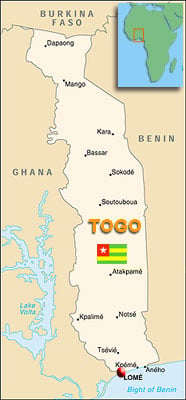The Togolese High Commissioner for Repatriation and Humanitarian Action (HCRHA) said it had repatriated 3,000 refugees and another 1,000 had requested repatriation. Fifteen-thousand have voluntarily returned.
Some 16,500 refugees remain in Ghana and Benin, including 6,000 at the Agame refugee camp near the Benin-Togo border, according to the United Nations refugee agency (UNHCR) and HCRHA. About 4,000 others are living with relatives in Benin’s main city, Cotonou, they said.
Violence erupted in Togo after the sudden death of long-time ruler Gnassingbe Eyadema early last year. His son, Faure Gnassingbe, stepped into his shoes but was pressured by regional leaders to hold elections in April. The political opposition and their supporters disputed his victory and clashed with security forces. About 40,000 people fled into neighbouring Benin and Ghana, fearing persecution.
The government and political opposition earlier this month signed an accord to end their political impasse, which began 12 years ago. The government promised to implement electoral reforms as well as accelerate the repatriation of refugees.
SCEPTICISM OVER GOVERNMENT MEASURES
Officials have launched various incentives to try to encourage the return of the refugees. Those who worked in the public sector can return to work if they have a document stating their refugee status, said Kokou Tcharie, HCRHA high commissioner. He said that refugees could receive help to find employment and lodging if they need it through the commission.
“We have anticipated a package between 30,000 and 120,000 CFA (US $60 - $235) to give to people, depending on whether this is a family or an individual returning,” he said.
To assuage fears concerning security, Togo’s prime minister in March instructed the armed forces, magistrates and police to avoid pursuing those they believed were involved in the election violence.
Nine committees made up of representatives from opposition parties and members of human rights groups are to welcome and provide assistance to returnees, including helping protect them from persecution.
Despite these efforts, many refugees fear returning to Togo.
“They raped our women who have now lost their will to live. We lost our brothers, our parents and they are now asking us to forgive those who tortured us, who chased us out of our homes like hunters after rabbits, all over an accord,” said Kossi M. “Those events are deeply etched in our memory.”
He said he believes that as long as the same people are in power, the current political agreement will never be respected.
“It is true that Togo is heaven on earth for us and we love it dearly, but we refuse to be butchered by machetes,” said Ben T. “If we go home today it is guaranteed that we will only be coming back here within three years, so we may as well not leave. Our problem is not about legislative elections but about the presidential one.”
The political accord’s provisions on elections only covers next year’s legislative polls.
“I voted for change and since there hasn’t been any and as long as there won’t be any, I’m not going back. Once Benin doesn’t want me anymore, I will go elsewhere,” he said.
RETURN AND RECONCILIATION
For some refugees, it is a question of caution as they wait to see how the situation will evolve. “We don’t trust these people yet, but the minute I feel confident in the situation, I will go home,” said Liliane G. at the Agame camp.
The HCRHA has attempted to reassure refugees that their safety will be guaranteed. “It was decided between the UNHCR in Benin and the Togolese government that a sampling of refugees would return to Togo for two weeks to see that security measures have been put in place and report back to those at the camp,” said Tcharie.
The HCRHA also launched an information campaign to encourage refugees to return to Togo and urge officials to guarantee their safety. The campaign has so far only aired on state-run media, but with funding from the UN Development Program (UNDP) it is to air and be published in private media as well, said Tchairie. He said messages would also appear on billboards.
Alfred Sohou, Benin's commissioner for civil protection, says he is optimistic about the reconciliation process. He believes that refugees will begin to feel better about returning to Togo once the political accord measures are put in place.
The Togolese government foresees signing an agreement with Ghana and Benin to define the legal framework for repatriation, which is voluntary.
“It is important to reintegrate the returning refugees and a certain number of the victims if we are to seal the reconciliation,” said Tcharie.
sd/jg/kdd/vj/cs
This article was produced by IRIN News while it was part of the United Nations Office for the Coordination of Humanitarian Affairs. Please send queries on copyright or liability to the UN. For more information: https://shop.un.org/rights-permissions





